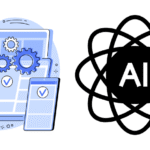
Reduce Time and Cost with Cross-Platform App Development: Bridging the gap between ambition and reality with smart tech solutions. Propel your business to new heights efficiently.”
Developing a mobile app can be a costly and time-consuming process, especially when building separate apps for each platform. However, cross-platform app development offers a solution to this problem. By creating an app that can run on multiple platforms, businesses can save on both time and cost.
Let’s dive in!
What is Cross-Platform App Development?
Cross-platform app development refers to the process of building mobile applications that can run on multiple operating systems, such as iOS and Android. Unlike traditional app development, where separate codebases and development teams are required for each platform, cross-platform development allows developers to write a single codebase that can be deployed on multiple platforms.
The process involves using a framework that allows developers to write code once and deploy it across multiple platforms. This approach not only saves time and effort but also reduces costs significantly, making it a popular choice among businesses and developers alike.
Advantages of Cross-Platform App Development
There are several advantages to using cross-platform app development. The foremost benefit is that it helps reduce development time and costs significantly. Instead of building separate versions of an app for different platforms, cross-platform app development allows developers to use a single codebase. This enables cross-platform apps to be developed faster and at a lower cost than traditional native apps.
Code reusability is another significant advantage of cross-platform app development. Developers can write their code once and use it across multiple platforms, such as iOS and Android. This approach also makes it easier to maintain and update the app since changes only need to be made once.
Cross-platform app development frameworks, such as React Native, Xamarin, and Flutter, also offer extensive support for creating visually appealing and responsive user interfaces. This ensures that the app’s UI remains consistent across different platforms and devices.
Faster time to market is another advantage of cross-platform app development. Since the development time is reduced significantly, the app can be launched faster, giving businesses a competitive edge.
Finally, cross-platform app development makes it easier to reach a larger audience. By creating apps that work seamlessly across multiple platforms, businesses can increase their potential customer base and revenue streams.
Choosing the Right Cross-Platform Framework
When it comes to choosing the right cross-platform app development framework, there are several factors to consider. The following are some of the most crucial elements:
| Factor | Description |
|---|---|
| Platform Support | Choose a framework that supports all the platforms you want your app to run on, including iOS, Android, and Windows. |
| Performance | Consider a framework that offers good performance and speed, especially for complex apps. |
| Community Support | Choose a framework that has an active and supportive community that can help you solve problems and answer questions. |
| Integration with Native Code | Consider a framework that can integrate seamlessly with existing native code, APIs, and plugins, enabling you to create a highly customized app. |
It is also essential to consider the organization’s technical expertise, resources, and budget available when selecting a framework. Some popular cross-platform app development frameworks include:
- React Native: A popular framework for developing apps for iOS and Android, using JavaScript and React.
- Xamarin: A framework that uses C# for creating apps for iOS, Android, and Windows platforms.
- Flutter: A relatively new framework for developing mobile apps that uses the Dart programming language.
Ultimately, the right choice of framework depends on the specific requirements of your app, your development team’s skills, and your organization’s goals. Conduct thorough research and testing to make an informed decision.
Best Practices for Cross-Platform App Development
Cross-platform app development can be a game-changer for businesses looking to develop apps for multiple platforms while saving valuable time and money. However, it requires following certain best practices to ensure the app is optimized for performance and user experience.
1. Code Optimization
Keeping the code optimized and lightweight is crucial for cross-platform app development. Utilizing design patterns and architecture, such as Model-View-ViewModel (MVVM) and Model-View-Controller (MVC), can help achieve this. Additionally, using libraries and frameworks can simplify the development process.
2. Consistent UI/UX Design
Consistency in UI/UX design across all platforms is essential for user satisfaction. Using a single codebase and design guidelines for all platforms can ensure consistency and minimize confusion. It is also crucial to test the app on all platforms to ensure consistency.
3. Testing Strategy
Cross-platform app testing should be done thoroughly on each platform to ensure compatibility and functionality. Utilizing automated testing tools and frameworks can simplify the testing process and reduce manual testing time. It is also crucial to test the app on various devices to ensure compatibility and performance.
4. App Performance Optimization
Cross-platform app development can sometimes result in performance issues due to platform-specific limitations. To optimize the app’s performance, developers should optimize the app’s memory usage, minimize network calls, and use platform-specific APIs for better performance.
5. Collaboration and Communication
Collaboration and communication among the development team and stakeholders are crucial for successful cross-platform app development. Regular meetings, progress reports, and feedback sessions can ensure that everyone is on the same page and the development process is running smoothly.
Tools and Technologies for Cross-Platform App Development
Cross-platform app development has been made easier and faster with the help of several tools and technologies. Here are some popular ones:
| Framework | Description | Platforms Supported |
|---|---|---|
| React Native | A JavaScript-based framework that allows building apps for both iOS and Android, using a single codebase. It provides a native-like experience and is used by popular apps like Facebook and Instagram. | iOS, Android, web |
| Xamarin | A Microsoft-owned framework that allows building native-like apps for iOS, Android, and Windows using C# and .NET. It provides access to native API and UI components and is used by big names like Slack and Pinterest. | iOS, Android, Windows |
| Flutter | A Google-backed framework that uses Dart programming language to build high-performance, visually appealing apps for iOS and Android. It offers a wide range of customizable widgets and has been used by popular apps like Alibaba and Google Ads. | iOS, Android, web |
Other notable tools and technologies used in cross-platform app development include Apache Cordova/PhoneGap, Ionic, and Unity (for gaming apps).
Comparing Cross-Platform Frameworks
The choice of framework mainly depends upon the project requirements, the in-house expertise of developers, and the level of platform support required. While React Native is a popular choice due to its ease of use and community support, Xamarin offers strong native API access and is ideal for complex projects. Flutter, on the other hand, offers a fast development cycle and customizable widgets that can help achieve the desired look and feel.
Case Studies: Real-Life Examples of Successful Cross-Platform Apps
Cross-platform app development has gained traction over the years, with several popular applications leveraging this approach to offer seamless experiences to their users. Below are some real-life examples of successful cross-platform apps that have proven the effectiveness of this approach:
| App Name | Platforms | Description |
|---|---|---|
| Uber | iOS, Android | The ride-hailing giant uses React Native to build its app for both iOS and Android platforms, resulting in improved development speed and cost savings. |
| Skype | iOS, Android, Windows Phone | The video conferencing app was developed using Xamarin, allowing for one codebase that could be shared across multiple platforms, resulting in faster development cycles and cost savings. |
| Walmart | iOS, Android | The retail giant’s app was built using Flutter, resulting in a fast and responsive design across both platforms with reduced development time and costs. |
These are just a few examples of how cross-platform app development can help businesses achieve their goals more efficiently. With the continued development of new cross-platform frameworks and technologies, we can expect to see even more successful applications built using this approach in the future.
Cross-Platform App Development vs. Native App Development

When it comes to choosing between cross-platform app development and native app development, there are pros and cons to both approaches. Here are some key factors to consider:
| Factor | Cross-platform app development | Native app development |
|---|---|---|
| Development time and cost | Pros: Faster development time and cost savings due to code sharing and reusability across platforms. | Cons: Longer development time and higher cost due to separate codebase and development for each platform. |
| Performance and user experience | Cons: May experience performance issues and lack of native features, leading to a potential compromise in user experience. | Pros: Provides better performance and user experience due to development being tailored to each platform. |
| Compatibility and updates | Pros: Easier compatibility and updates across multiple platforms due to shared codebase. | Cons: Requires update for each platform separately and may experience compatibility issues. |
| App complexity and functionality | Cons: May not support complex features and functionality available only on a particular platform. | Pros: Allows for better utilization of native features and functionality available exclusively on each platform. |
Ultimately, the best approach will depend on your specific project needs and goals. If time and cost are a priority and the complexity of your app is relatively low, cross-platform development may be a good fit. However, if you require advanced functionality and native features that are unique to each platform, native development may be a better choice. Consider all factors when making your decision, and consult with a professional developer as needed.
Common Challenges and Solutions in Cross-Platform App Development
Cross-platform app development can present unique challenges that developers must be prepared to overcome. Here are several common challenges and their solutions:
Limited Access to Native APIs
Cross-platform frameworks are often limited in their access to native APIs compared to native app development. This can make it difficult to implement certain features or functionality within the app. However, some cross-platform frameworks, like React Native, provide access to a wider range of native APIs, allowing for more flexibility in development.
Performance Issues
Cross-platform apps may experience performance issues due to the additional layer of abstraction between the app code and the operating system. To address this issue, developers can optimize their code, implement caching strategies, and minimize network requests to improve the app’s performance.
UI/UX Consistency
One challenge of cross-platform app development is ensuring consistency in the app’s user interface and user experience across multiple platforms. To address this challenge, developers should adhere to platform-specific design guidelines and use design patterns that work well on all platforms. Additionally, adopting a unified design system can help ensure consistency and improve overall user experience.
Debugging
Debugging cross-platform apps can be more challenging than debugging native apps, as issues may arise from differences in the operating systems or device models. To address this challenge, developers can use cross-platform debugging tools, such as Chrome DevTools or Xcode Debugging, to identify and fix issues during development.
By being aware of these common challenges and implementing effective solutions, developers can overcome the obstacles inherent in cross-platform app development and create successful, high-quality apps.
Frequently Asked Questions about Cross-Platform App Development

As cross-platform app development gains popularity, many developers have questions or concerns about this approach. Here are some commonly asked questions about cross-platform app development:
Q: What is cross-platform app development?
Cross-platform app development is the process of developing mobile applications that can run on multiple platforms, such as iOS and Android. Instead of building separate apps for each platform, developers can use cross-platform tools to create a single codebase that works across different platforms.
Q: What are the benefits of cross-platform app development?
Cross-platform app development offers several benefits, such as faster development time, cost savings, and code reusability. It allows developers to create applications that work on multiple devices with a single codebase, reducing the need for separate development teams and lowering maintenance costs.
Q: What are the popular cross-platform tools for app development?
Some of the popular cross-platform tools for app development include React Native, Xamarin, and Flutter. These tools offer a range of features and benefits for developers, such as faster development time, easy integration with different platforms, and a large community of developers providing support.
Q: How does cross-platform app development compare to native app development?
Cross-platform app development differs from native app development in terms of the approach and the tools used. While native app development involves building separate apps for each platform using the specific programming languages and tools, cross-platform app development uses a single codebase that runs across multiple platforms. This allows for faster development time and cost savings, but may result in performance limitations or platform-specific limitations.
Q: What are some common challenges in cross-platform app development?
Some common challenges in cross-platform app development include performance optimization, UI/UX consistency across different platforms, and code maintenance and debugging. However, these challenges can be addressed through best practices, such as using proper testing strategies, optimizing code for different platforms, and ensuring consistency in design and user experience.
Q: How can I decide if cross-platform app development is the right approach for my project?
The decision to choose cross-platform app development versus native app development depends on several factors, such as the complexity of the app, the project timeline, and the target audience and platform requirements. Developers should evaluate the pros and cons of each approach and choose the one that best meets their project requirements.
William is a highly accomplished technical author specializing in cross-platform app development. With a rich background in the tech industry, he has worked at prestigious companies like Uber and Facebook, where he honed his skills as an iOS developer since 2009. Throughout his career, William has been an advocate for leveraging frameworks like React Native and Xamarin to create innovative and efficient cross-platform mobile apps.
Having pursued a degree in Computer Science and Mathematics at Caltech, William is equipped with a strong educational foundation. Currently residing in LA with his two daughters, he finds solace in exploring the scenic hills through hiking. Passionate about knowledge sharing, William not only builds cutting-edge applications but also takes pleasure in teaching students how to develop their own cross-platform mobile apps. His expertise, combined with his dedication to empowering others, makes him an invaluable asset in the field of app development.







